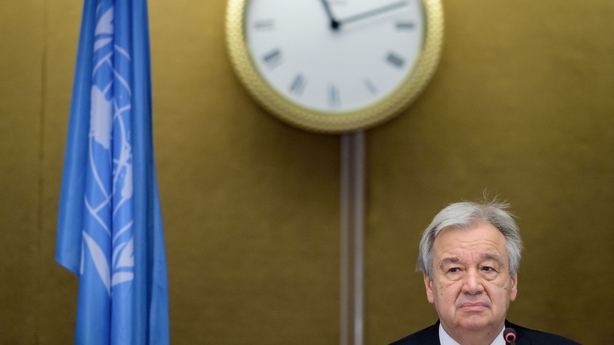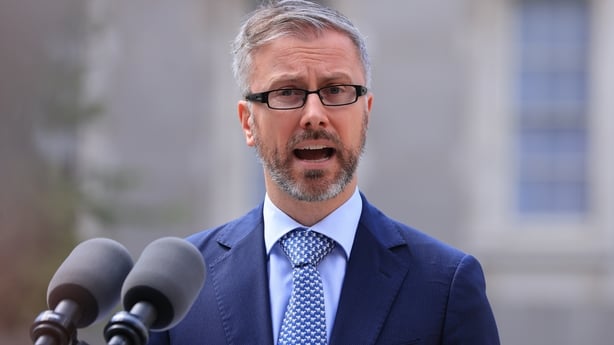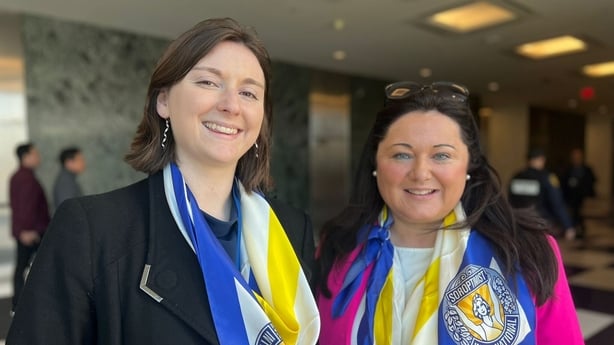In the entrance lobby of the UN headquarters hang the portraits of all eight former UN secretaries-general.
They are all men.
But this week, the lobby is full of women. They have gathered here in New York for the UN's annual Commission on the Status of Women, which coincides with International Women's Day, to discuss gender equality.
"We come here every year and, when I look at those pictures, I feel sad that women are not represented," a delegate from an Africa-based charity, who preferred not to be named, told RTÉ News.
"I want to see women on the wall – at least one or two," she added.
Opening the session on Monday, the current UN Secretary-General, António Guterres (also a man), painted a grim picture of the state of women’s rights globally.
"From Ukraine to the Sahel, crisis and conflict affect women and girls first and worst," he said.
"Progress won over decades is vanishing before our eyes," he said, referencing the erasure of women from public life in Afghanistan and the rolling back of reproductive rights in many parts of the world.
"Gender equality is growing more distant," he said.
"On the current track, UN Women puts it 300 years away."

A commitment to equal rights for women has been a cornerstone of the United Nations since its founding.
So why has progress stalled?
"There has always been push-back when power structures are challenged," Greenland’s Minister for Finance and Gender Equality, Naaja Nathanielsen, told RTÉ News.
"These past years, women have been speaking out with more power. New ground has been broken around the world in regard to representation and legislation and this has caused a push back," she added.
"Pushing Back the Push-Back" was the name of a side-event organised by the Nordic states on Monday, where the rise in cyber abuse of women and girls was discussed.
"The political measures taken have not been in phase with the technological development," said Paulina Brandberg, Sweden’s Minister for Equality.
"We have seen the internet more as a tool than a place – my view is that we need to see it as a place. For much too long, crimes against women have gone without consequences," she said.
Discussions of gender-based violence online also took centre stage at an event organised by the Irish delegation.
"Just as much as the online space opens up huge new opportunities, it also opens up huge new vulnerabilities as well," Minister for Equality Roderic O'Gorman told RTÉ News.

Minister O'Gorman is representing Ireland at the Commission on the Status of Women.
"Particularly because the online space can target you wherever you open your phone or your laptop, it diminishes the safe space that any female politician or representative may have otherwise enjoyed," he said.
But the problem lies in the design of an online world rigged with the same patriarchal power structures as the real one, according to two Irish delegates I bumped into on the escalators on their way from a meeting inside the UN.
"It’s an extension of gender-based violence that’s happening in the physical world and it’s about the digital transformation of our lives and how we communicate with each other," said Eadaoin Lawlor, President of Soroptimist International, Ireland.
"Really if someone wants to promote themselves, the first port of call is online – and that leaves everyone open to abuse."
She noted that the people who design the algorithms that target women and girls are, more often than not, men.
"We need to make sure the internet doesn’t go in the same direction as these institutions and that women are part of the design and implementation," said Sarah Giblin of Soroptimist Dublin.
"What we are really hoping to gain from this event is some key points what needs to be actioned from a government level, on a civil society level and also importantly private companies because they are most definitely complicit in ensuring the safety of women online," she said.

"Ireland needs to ensure that we are signed up to conventions targeting these issues and that from a legislative point of view we have addressed them within our criminal law.
"It’s not possible to go to court and penalise people if we don’t have it in the law," she added.
Seven women were among the candidates who stood for the position of UN Secretary-General in 2016, but lost out to the incumbent António Guterres, now in his second term.
Last year, the former president of the General Assembly, Abdulla Shahid, called it "shameful" that only male candidates had ever made it to the top job.
"If we can't find one single woman in seven decades to lead the agency, I think there is absolutely something wrong," he said.
Asked this week by RTÉ News if the Secretary-General had considered making a grand gesture to underline his support for gender equality, such as stepping aside and giving his job to a woman, his spokesperson said that resigning was not something he was contemplating "in any way, shape, or form".
"He will continue and has, I think, shown demonstrable results in improving and reaching gender parity in the senior posts that he appoints," the spokesperson added.







